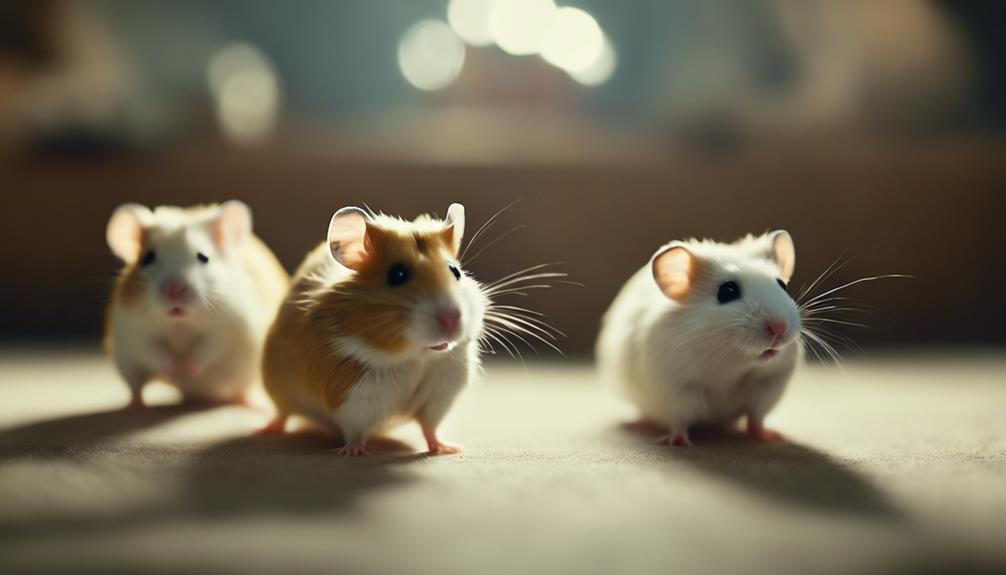Do All Hamster Species Have the Same Care Needs?

Some common factors to consider when caring for hamsters include their diet, exercise requirements, habitat preferences, and social needs.
Each species may have different preferences when it comes to bedding, toys, and enrichment activities.
It is important to research and understand the specific needs of the hamster species you have to provide them with a healthy and enriching environment.
Overview of Hamster Species
When exploring the world of hamsters, one quickly realizes the diverse and fascinating array of species that exist within this beloved rodent family. Each species comes with its own set of unique care requirements and characteristics. From the Syrian hamster, known for its solitary nature, to the Roborovski hamster, which is highly social and thrives with companionship, the species differences are vast.
Understanding these distinctions is crucial for providing the best care for these small pets. For example, the Chinese hamster requires a cooler environment compared to other species due to its origin in cooler climates. On the other hand, the Campbell's dwarf hamster needs a wheel for exercise to prevent boredom and obesity.
Housing Requirements
Proper housing for hamsters is essential to ensure their well-being and happiness. When setting up a cage for your hamster, consider the following:
- Cage setup: Choose a cage with narrow bar spacing to prevent escapes. Provide ample space for your hamster to explore and exercise.
- Bedding options: Opt for safe bedding materials such as aspen shavings, paper-based bedding, or hay. Avoid cedar and pine shavings as they can be harmful to your hamster's respiratory system.
Creating a cozy and enriching environment for your hamster is key to their overall health. Make sure to include hiding spots, tunnels, and chew toys to keep them mentally stimulated. Keep the cage clean by spot-cleaning daily and doing a full clean-out once a week. Remember, a well-maintained and appropriately set up cage will contribute to a happy and healthy hamster.
Diet and Nutrition

When it comes to caring for hamsters, understanding their dietary requirements and nutritional needs is crucial.
Hamsters have specific dietary needs that must be met to ensure their health and well-being.
Providing a balanced diet is essential for keeping these small pets happy and thriving.
Hamster Dietary Requirements
To ensure your hamster's well-being and health, understanding their dietary requirements is essential. Hamsters have specific food preferences and dietary restrictions that need to be considered. When it comes to their diet, achieving a nutritional balance is crucial for their overall health.
- Food Preferences: Hamsters enjoy a variety of foods, including fresh fruits, vegetables, and high-quality pellets.
- Dietary Restrictions: Avoid feeding your hamster foods that are high in sugar, salt, or fat, as these can be harmful to their health.
- Nutritional Balance: Provide a mix of seeds, grains, and nuts to ensure your hamster receives all the necessary nutrients.
- Supplement Options: Consider supplementing your hamster's diet with small amounts of fresh herbs or leafy greens for added vitamins and minerals.
- Water: Always ensure your hamster has access to fresh, clean water to stay hydrated.
Nutritional Needs for Hamsters
Understanding the dietary requirements and nutritional needs of hamsters is crucial for ensuring their overall health and well-being. Achieving a nutritional balance is key to keeping your hamster healthy and happy.
A diet rich in high-quality hamster pellets, fresh fruits, and vegetables will provide essential nutrients. However, it's essential to avoid overfeeding, as obesity can lead to various health issues.
Vitamin supplements may be necessary if your hamster's diet lacks certain nutrients, but always consult with a veterinarian before adding supplements.
Exercise and Enrichment
Ensuring your hamster gets enough exercise and mental stimulation is crucial for their overall well-being and happiness. These small creatures are naturally active and curious, so providing them with opportunities to engage in enrichment activities and maintain an exercise routine is essential.
Here are some tips to keep your hamster mentally stimulated and physically active:
- Rotate toys and accessories: Keep their environment interesting by changing up their toys and accessories regularly.
- Create a maze or obstacle course: Stimulate their mind by setting up a fun maze or obstacle course for them to explore.
- Use puzzle feeders: Challenge your hamster's problem-solving skills by using puzzle feeders to dispense treats.
- Provide a running wheel: Hamsters love running, so make sure to include a safe and appropriately sized running wheel in their enclosure.
- Supervise playtime outside the cage: Allow your hamster to explore outside their cage in a secure and supervised area for additional exercise and enrichment.
Socialization and Handling

Socializing and handling your hamster gently and patiently is key to building trust and fostering a strong bond with your furry friend. When it comes to socialization techniques and bonding, it's essential to create a calm and quiet environment for your hamster to feel secure. Start by spending time near their cage, talking softly to them, and offering treats to associate your presence with positive experiences. Gradually, introduce gentle handling into your interactions, allowing your hamster to sniff your hand before attempting to pick them up.
Developing proper handling skills is crucial for trust-building. Always scoop your hamster up with both hands, supporting their body to make them feel safe. Avoid sudden movements or loud noises that can startle them. Remember, every hamster has its unique personality, so be patient and respect their boundaries.
Building a strong bond takes time and consistency, but the rewards of a trusting relationship with your hamster are immeasurable.
Health Considerations
A crucial aspect of caring for your hamster is maintaining their health through regular observation and attention to their well-being. Keeping your furry friend healthy involves preventing illnesses and providing timely veterinary care. Here are some essential health considerations for your hamster:
- Proper Nutrition: Ensure your hamster has a balanced diet rich in essential nutrients to support their overall health and immune system.
- Clean Environment: Regularly clean your hamster's cage to prevent the buildup of bacteria and parasites that could lead to health issues.
- Observation: Monitor your hamster daily for any changes in behavior, appetite, or physical appearance that could indicate an underlying health problem.
- Hygiene: Keep your hamster clean by providing a dust bath for grooming and maintaining their fur and skin health.
- Regular Vet Visits: Schedule routine check-ups with a small animal veterinarian to ensure your hamster is in good health and catch any potential issues early.
Grooming Needs

To maintain your hamster's well-being, attending to their grooming needs is essential for their overall health and happiness. Hamsters are meticulous groomers themselves, spending a significant amount of time cleaning their fur and whiskers. However, as a responsible pet owner, there are grooming tasks you should assist with to ensure your hamster stays healthy and content.
Here is a helpful table outlining essential grooming needs for your furry friend:
| Grooming Needs | Description | Importance |
|---|---|---|
| Bathing habits | Hamsters are self-cleaning animals and do not require baths. Excessive bathing can strip their fur of natural oils. | Monitoring is key. |
| Grooming techniques | Regularly provide a dust bath for dwarf hamsters to help with excess oils. Syrian hamsters usually groom themselves. | Observation is crucial. |
| Hair care | Check for any matted fur or signs of hair loss. Consult a vet if necessary. | Preventive care is vital. |
| Nail trimming | Keep an eye on your hamster's nails and trim them if they get too long to prevent injuries. | Regular maintenance. |
Conclusion and Recommendations
Considering the diligent care and attention required for grooming a hamster, it's imperative to also focus on other aspects of their well-being in the conclusion and recommendations. When it comes to hamster care, one size doesn't fit all. Tailoring care to their unique requirements is crucial for their health and happiness. Here are some key points to consider:
- Species Specific Care: Different hamster species have varying needs. It's essential to research and understand the specific care requirements of your hamster's species.
- Individual Needs: Just like humans, each hamster has its own personality and preferences. Observing and adapting to your hamster's individual needs is vital for their well-being.
- Tailoring Care: Customizing the care routine according to your hamster's behaviors and responses ensures a comfortable environment for them.
- Unique Requirements: Some hamsters may need specialized care due to age, health conditions, or past experiences. Being attentive to these unique requirements is crucial.
- Continual Assessment: Regularly evaluating your hamster's health, behavior, and living conditions helps in adjusting care practices for their optimum wellness.
Frequently Asked Questions
Can All Hamster Species Be Kept Together in the Same Cage?
When considering keeping different hamster species together in one cage, compatibility concerns arise due to behavioral differences. Cage size is crucial to prevent territory issues. It's wise to provide separate living spaces for each species.
Are Certain Hamster Species More Prone to Certain Health Issues Than Others?
Certain hamster species may be more prone to specific health issues due to genetic predispositions and environmental factors. Understanding their diet requirements and exercise needs can help prevent potential health problems and ensure their well-being.
Do Different Hamster Species Have Different Lifespans?
Different hamster species exhibit varying lifespans due to factors like dietary requirements, exercise habits, environmental preferences, and behavioral traits. Understanding these nuances is crucial for providing optimal care tailored to each hamster's specific needs.
Are There Certain Hamster Species That Are More Social and Enjoy Being Handled Than Others?
Like different flavors of ice cream, hamster species vary in their social behaviors and handling preferences. Some are more outgoing and enjoy interaction, while others may be more reserved and prefer solitude.
Are There Any Specific Grooming Needs That Vary Between Different Hamster Species?
When it comes to hamster species, specific grooming needs can vary. Some may require more frequent grooming due to longer fur or other factors. It's essential to research and understand the unique requirements of each type.








